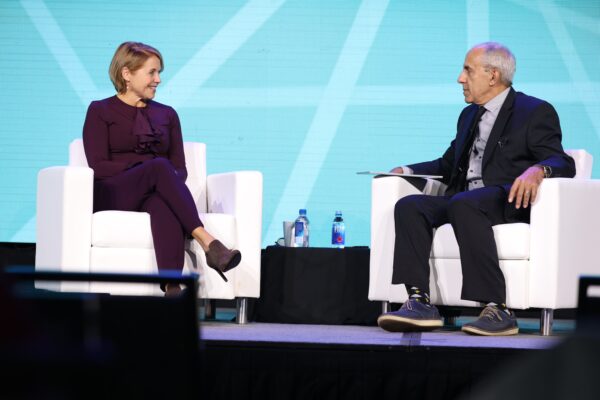
Journalist Katie Couric and Greg Simon, former executive director of the White House Cancer Moonshot Task Force at the Manova Health Summit in Minneapolis.
Katie Couric once sought to inform Americans about the importance of an early cancer diagnosis by airing her own colonoscopy on TV.
“It was one of the proudest moments of my career,” she told an audience at the Manova Global Summit on the Future of Health in Minneapolis, to receptive applause. A study by the University of Michigan showed a 20 percent jump in colonoscopies after hers aired on the Today Show in 2000, she added.

With the Rise of AI, What IP Disputes in Healthcare Are Likely to Emerge?
Munck Wilson Mandala Partner Greg Howison shared his perspective on some of the legal ramifications around AI, IP, connected devices and the data they generate, in response to emailed questions.
The celebrity journalist remains just as committed to helping cancer patients today, she continued, though she now uses her influence as a co-founder of the non-profit Stand Up to Cancer as her main platform.
Couric lost her husband to colon cancer when he was 41; the couple’s daughters were 1 and 5. Four years later, she lost her sister to pancreatic cancer.
“After Jay died, I realized how little I know about colorectal cancer, and it’s the second-leading cause of cancer death,” she said. “I felt I had a real obligation to inform the millions of people who were watching me. I wanted them to understand what I didn’t know. When you have the potential to save lives, to give people truly life-saving information, to allow them to be there for their families, it’s almost criminal not to take advantage of that.”
Knowing that fewer than one in 10 research proposals gets funded by the government, Couric and nine women from the media and entertainment industry decided to try to quicken the pace of cancer research. With a mission of incentivizing collaboration instead of competition, they founded Stand Up to Cancer in 2008. With over $600 million raised since then, the non-profit has funded 1,600 scientists. , many of them working in what the nonprofit calls “dream teams.” The 180-plus clinical trials it has funded have contributed to six new FDA-approved drugs, and two of the scientists have won Nobel prizes.
A year ago, the leader of the nonprofit’s Immunology Dream Team, Jim Allison, won the Nobel Prize for Medicine for his pioneering work in immunology. And earlier this month, a member of the non-profit’s scientific advisory committee, Dr. William Kaelin, won the award for discoveries in cancer cell metabolism.
The Nobel prizes notwithstanding, cancer researchers generally “get very little credit and not enough support; they’re my personal heroes,” Couric said.
And while it’s an exciting time in cancer research, with immunotherapies helping people with previously incurable cancers thrive, “for people who are sick, it doesn’t come fast enough,” Couric says. When her husband, Jay, was sick, she remembers hoping and praying for an innovation to help him manage the disease.
“That was 21 years ago, and we’re still waiting,” she says. “So we’re putting our foot on the gas pedal to get people into clinical trials in a much more accelerated way.”
For people without insurance, surviving cancer is even harder, noted moderator Gregory Simon, former president of The Biden Cancer Initiative and former executive director of The White House Cancer Moonshot Task Force. In fact, whether or not you have insurance is the single biggest determinant of survival, he said. Couric agreed, adding that colonoscopies need to be more accessible to underserved communities.
If her sister were alive today, Couric has a feeling the once up-and-coming politician would be running for president. Couric uses that as motivation.
“For every young person who loses his or her life, it motivates me even more to keep trying,” she said. “I just feel like we’re doing so much in the world and the fact that cancer is confounding and wily and persistent — and that it can outsmart chemo or even immunotherapy — is frustrating,” she said.
Photo: Andrew McGee, Manova














